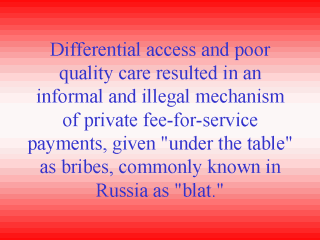 |
Medical
necessities, surgery, drugs, bandages, clean sheets, even food, often had to be bought by
inpatients from hospital administrators, physicians, nurses, or orderlies. For those
without the economic resources to purchase private medical care, the minimal prevailing
level of government care had to suffice. This often meant being hospitalized for extensive
observational periods without receiving any specific treatments because of an intermittent
lack of equipment and adequately trained specialists. Shortages in intravenous fluids,
sutures, antibiotics, vaccinations, and durable goods such as tape and bandages were
endemic and even openly criticized in the press by the Communist Party Congresses
(Brezhnev 1981; Feshbach 1982a, 1985a). |
